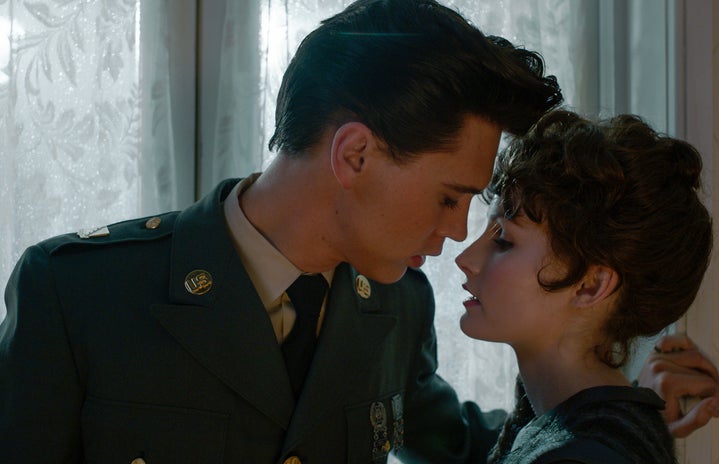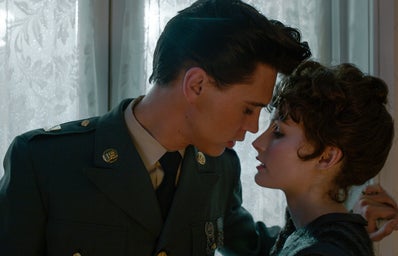Recently, Elvis Presley has been a hot topic in Hollywood. Last year, audiences enjoyed Baz Luhrmann’s Elvis, which depicts the rise and fall of the rock star. Just this past month, Sofia Coppola’s Priscilla was released in theaters, placing Elvis in a supporting role as the narrative focuses on his young wife, Priscilla Beaulieu Presley. The film, based on the 1985 biography written by Priscilla about her life with Elvis, explores the complexities of her feelings toward her husband throughout their ten-year relationship. It captures the ebbs and flows of her mindset, reflecting the changing dynamics between them.
Priscilla and Elvis are about as different as two films could be. Whereas Elvis is flashing montages and loud music, Priscilla is subdued, with a muted color palette and long scenes of silence and whispered dialogue. A significant portion of Elvis focuses on the icon’s performances. With Austin Butler playing the lead, he gyrates in flamboyant jumpsuits, soulfully singing, dancing, and sweating across the stage. Priscilla features only one clip of Elvis performing, and it isn’t even one of his songs. Rather, what plays is the theme from Stanley Kubrick’s 1968 masterpiece, 2001: A Space Odyssey. The film Elvis is told entirely through the perspective of his manager, Colonel Tom Parker, while Priscilla references the Colonel only once or twice off-handedly. Priscilla is entirely about Priscilla, and we see her life with Elvis through her eyes. This highlights the most glaring difference between the two films: In Elvis, Priscilla barely feels like a character. In Priscilla, she’s the star.
Elvis pays little attention to the connection between its namesake and his wife. We see them meeting in Germany, where Elvis and Priscilla’s father are stationed at the same military base, serving in their respective branches. Their 10-year age gap, with Priscilla being just 14 when their relationship begins – isn’t touched upon. Beyond that initial meeting, Priscilla remains in the background of the film until her final scene, where she leaves a sobbing Elvis behind. She’s a plot device within the narrative of the film. Never does she have her own personality or agency.
In Priscilla, a more nuanced approach to Priscilla and Elvis’s relationship is the focus. Priscilla is quickly established as a lonely teenager, isolated from her peers after her family’s relocation to Germany. Upon their first encounter, Elvis inquires about Priscilla’s grade level, finding out she’s in ninth grade, to which he remarks that she’s just a baby. In their next meeting, he kisses her, an act that sharply highlights the precarious foundation of their relationship. Elvis appears to take pleasure in the power he holds over her, underscored by his celebrity status and their age difference.
Coppola doesn’t shy away from portraying the discomfort in the film. There are scenes where Priscilla and Elvis’s relationship appears strong – Elvis gifts her a dog, they go roller skating, they have pillow fights. Yet, often, we are starkly reminded of the relationship’s strangeness. Elvis directs her to change her hair color and to apply more eye makeup. He disparages her style choices. He yells at her when she confronts him about his infidelities. At the midway point, the film reaches a striking moment during Priscilla’s high school graduation, reminding the audience of how young she is and the innocence and individuality that were taken from her. For every instance Coppola depicts their bond as a loving one, she equally ensures to show that it is far from a conventional romance.
In Priscilla, Jacob Elordi portrays a very different Elvis from the Elvis film with Austin Butler. Butler’s Elvis felt like more of a spectacle – the Elvis we’re used to seeing in his films and live performances, one who’s dramatic and bold. Elordi portrays Elvis, a character known only to Priscilla, as suave and charming at times, and violent and manipulative at others. He towers over Cailee Spaeney, who portrays Priscilla, further emphasizing the power dynamics present between them. The sole trait the two portrayals share is the classic “Elvis” accent that both actors adopt.
In Elvis, Priscilla is not the focus, which is fitting for the film’s intent. The movie centers neither on her nor on their relationship, but instead on Elvis’s challenges with his manager. For this reason, Priscilla takes on a small role within the story. However, with the film’s popularity last year ($288.7 million and eight Oscar nominations!), it is both timely and welcome for Priscilla to swoop in and fill the gaps that Elvis left. Priscilla offers a more balanced perspective of Elvis, advocating for a view of him not as a figure to be idolized or vilified, but as a human being with complexities. As Elvis himself once remarked, “The image is one thing, and the human being is another…it’s very hard to live up to an image.”
In American culture, there is perhaps no more recognizable image than that of the King of Rock ‘n’ Roll. Thanks to Priscilla, we gain a deeper understanding of the man behind that image, warts and all. This is truly the perfect film to take in over the Thanksgiving holiday break. So grab some popcorn and go!


